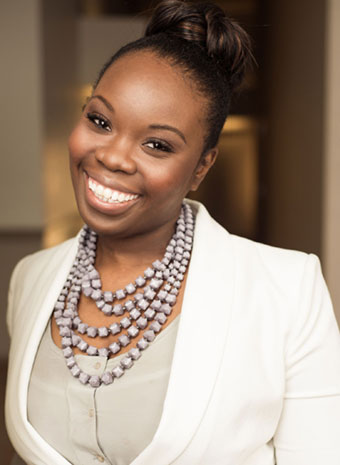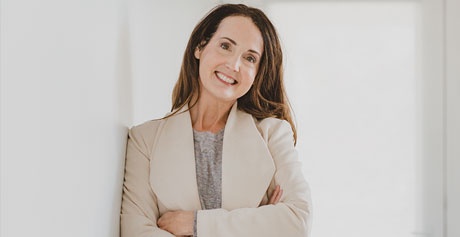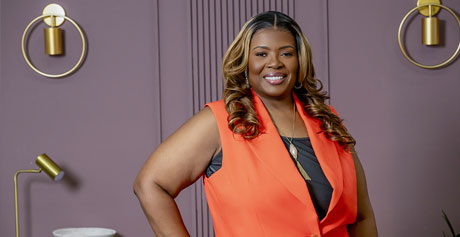Putting Her Imagination to Work with Understanding & Commitment Meet, Atlanta Attorney, Johnetta G. Paye, Esq.
 Q: How old were you when you knew you wanted to pursue a career in the legal field?
Q: How old were you when you knew you wanted to pursue a career in the legal field?
JP: I was about 8 or 9 years old. Initially, I wanted to be an actress. I was going to be the next Whoopi Goldberg. I grew up in an immigrant household so being an actress was frowned upon. I was encouraged to become a doctor, lawyer, or something that my African parents considered sensible. Then I thought about what could I do to support people in the arts. I decided to become a lawyer. I loved reading, writing and debating an issue. Being a lawyer allowed me to use these skills to help others. I wasn’t the strongest at Math and Science so being a doctor was out for me.
Q: What expectations did you have after graduating and receiving your law degree?
JP: After graduating from law school and becoming a lawyer, I fully expected to work at a firm or media company. While I was waiting for my bar exam results I interned at the then-Senator Barack Obama Chicago Senate Office. I also volunteered at his Chicago campaign headquarters. That experience helped to influence my decision to start my own law practice.
I graduated from law school in 2008, at the height of the recession. The job market was competitive, and I decided if no one would give me a job, I would create one for myself. On January 1, 2009, I launch my law practice J. Paye & Associates Attorneys at Law by sending out an email to friends and family letting them know I had started my own law practice.
Q: You earned your law degree while in Chicago … what brought you to Georgia?
JP: A client of mine, Jay Morrison asked me if I would be willing to relocate from Chicago to Atlanta to help him start Tulsa Real Estate Fund (TREF). TREF was the first 100% minority-owned regulation a Real Estate Crowdfund. I am an equity partner in TREF as a result of dedicating a little over two years to help form the company.
Q: How long have you practiced law?
JP: I have been practicing law for 10 years now.
Q: Can you share with our audience, regarding Entertainment Law, what types of situations may occur that would require your expertise?
JP: As an entertainment lawyer I primarily negotiate deals & review contracts for artists & creatives. I primarily work with independent artists. I’ve negotiated licensing deals for my client’s songs to be used in film & television shows. I’ve also negotiated collaboration agreements for my clients to collaborate with major Artists.
I also work with artists, creatives and entertainers to protect their brand through copyrights and trademarks.
Q: How did your Law firm get involved in the Real Estate arena?
JP: It takes a while to break into the entertainment industry and build a name for yourself. I had bills to pay. I knew there was money to be made in real estate. I paid an experienced real estate attorney to teach me how to handle real estate closing & other real estate legal matters. Eventually, I got to a point where I felt comfortable handling real estate matters on my own.
It was my knowledge & experience in real estate law that open the door for me to move to Atlanta and be a part of helping to form the Tulsa Real Estate Fund.
Q: AI and Robotics are already playing a role in the legal field. What is your opinion on how this will play out in the future?
JP: AI and Robotics do play a role in the legal field now like helping to spot patterns in case law, which is a big part of being a litigator/trial attorney.
I don’t think that AI is going to replace lawyers. A robot isn’t going to passionately argue your case in the courtroom before a jury or judge. A robot is not going to negotiate contracts terms for clients.
I do think AI will be leveraged more to assist lawyers.
Q: What's the greatest fear you've had to overcome to get where you are today?
JP: leaving my comfort zone. I don’t know if it was fear. More like the greatest obstacle I had to overcome.
When I was three my older sister and I relocated from Liberia, a country in West Africa to join my parents in the United States.
Growing up in an immigrant home made me resourceful. I didn’t have anyone to show me how to write a resume, put together a strong college or law school application.
I grew up in Minnesota. I knew that I wanted to attend college in Chicago. I was the first person in my immediate family to graduate from college. Additionally, the first to go to college out of state.
It took some convincing to get my parents to allow me to attend DePaul University in Chicago. All of their Liberian friends that I would go to Chicago and become a victim of a violent crime. It did not help to reduce my parent’s anxiety, that I was going to be in Chicago all by myself.
Attending college in Chicago helped me realize that I have a lot of inner strength & resilience. My time in Chicago helped me to discover myself and mold me into the person I am today.
Then leaving my comfort zone to move to Atlanta. A city that I had only spent maybe 5 hours in before I moved here. When I made the decision to move everything happened quickly. I moved into my Atlanta apartment sight unseen.
When I moved to Atlanta, I experienced another level of growth. It’s the furthest, I lived from my family in Minnesota. I didn’t have any friends or family in Atlanta. When you are alone in a place that is unfamiliar to you it forces you to rise to the occasion quickly or say this is not for me and go back to your comfort zone.
In my heart, I knew I had to be resilient and rise to the occasion. It was a daily challenge for me. I’ve adapted to life in Atlanta, but I still have moments that challenge me.
Q: Can you tell our audience one of your most memorable moments in your career?
JP: I was in the courthouse talking to opposing counsel who happened to be an older caucasian male attorney. Another older Caucasian male attorney came up to him and started chatting. Then he looked at me and said, “Oh that’s your new assistant.”
Before I could respond, opposing counsel explained that I was also an attorney.
It was a memorable moment because it was the first time someone had verbally communicated they saw me as less than because I was a young African American Female.
Q: What’s one lesson you’ve learned in your career that you can share with our audience?
JP: I have two lessons. The first is you have to take action. If you don’t take action towards your dream, they never become a reality.
The second is fail fast. Failure is how you learn what works and what does not. In failure you learn to pivot quickly and become stronger. It’s never a failure but a learning lesson.
Q: Which woman inspires you and why?
JP: Oprah. She came from a small town and made a global impact on the lives of others. She helped me to see that where you come from doesn’t determine who you can become.
Michelle Obama for her strength. Also, because we are both lawyers and members of the Illinois Bar.
Q: What are some of the challenges you feel women face today?
JP: The constant challenge of being underestimated.
Q: What advice would you give to young women who want to pursue a career as an Attorney?
JP: Make sure it’s something that you really want to do because law school is challenging and so is the bar exam. Your motivation to become a lawyer has to be greater than money or status to keep going despite the pressures associated with becoming a lawyer.
Don’t become a lawyer because someone else thinks you should or wants you too. Yes, my parents thought it was sensible for me to become a lawyer. I became a lawyer because I wanted to be one.
Learn to be patient because the process of becoming a lawyer is a waiting game. You have to wait for your LSAT scores to come back, wait to find out if you got into law school and wait for bar exam results.
Even after you become a lawyer you still wait on things, for example, the judge or jury to come back with a verdict if you are a litigator.
Q: What's your advice for women in male-dominated fields?
JP: You have to believe in yourself. If you have a strong sense of self-belief you can accomplish things you thought you were incapable of achieving.
When you believe in yourself and produce results the respect from others follows.
Five Things About Johnetta G. Paye
1. If you could talk to one famous person past or present, who would it be and why?
Harriet Tubman. I want to know made her courageous and fearless to go back an forth so many times at risk to herself to help others achieve freedom.
The other would be Nelson Mandela to discuss the personal sacrifices he made to become a lawyer and help bring about political change in South Africa.
I guess I am inspired by change makers and leaders.
2. Which celebrity do you most identify with?
Diddy … I identify with his drive and determination.
3. Is there something else you would like to accomplish?
I have a few businesses that I want to build. I feel that these businesses will define my legacy.
4. What app can’t you live without?
The calendar app. If it’s not on my calendar it’s not happening. Then second would be the email app. I do a lot of business on the move.
5. What place in your house do you feel the most comfortable?
The bathroom … it’s where I do my best thinking. Growing up, it was the only place I could get quite time from my family as a child.


